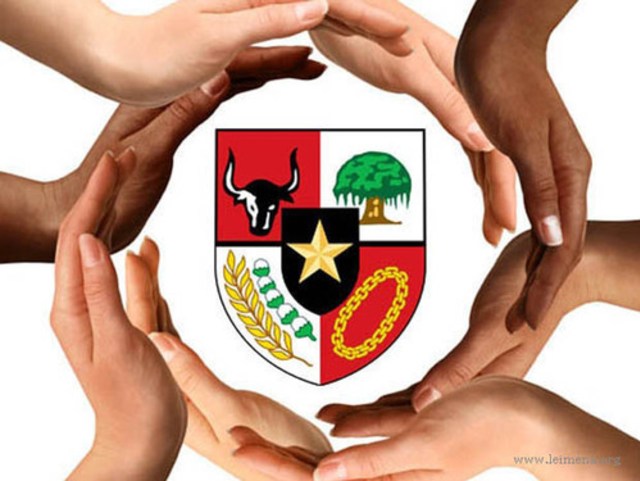Tentang KamiPedoman Media SiberKetentuan & Kebijakan PrivasiPanduan KomunitasPeringkat PenulisCara Menulis di kumparanInformasi Kerja SamaBantuanIklanKarir
2025 © PT Dynamo Media Network
Version 1.103.0
Konten dari Pengguna
A Comparison Between Indonesian Ideology (Pancasila) and Other Countries’ Ideology
24 Februari 2018 8:54 WIB
Diperbarui 14 Maret 2019 21:11 WIB
Tulisan dari Shafira tidak mewakili pandangan dari redaksi kumparan

ADVERTISEMENT
As an ideology, the basis of the state, and the outlook of Indonesia, it is certain that Pancasila is no longer uncommon to us. And of course, we all know that since decades ago, our ancestors had to apply the values of Pancasila in their daily life. In addition, there are likewise numerous ideologies in the world that are moderately distinctive from the identity of Pancasila. Take examples of US with its Liberalism ideology, or North Korea that emphasizes Communism, and Socialism that is enforced by Republic of China.
ADVERTISEMENT
Substantially, almost each of those ideologies that has been mentioned asserted particular characteristics that are contrary with the ideology of Pancasila. In consequence, the primary expectation of this essay is to elaborate more about such characteristics of four different ideologies from the perspective of various aspects, such as Law, Economics, and Religion.
Unlike Pancasila that enforced its Law aspect to uphold fairness and civility of both individuals and communities, the Liberalism’s law of political ideology tends to be more inclined to protect the individuals rather than towards the people within communities as a whole. In the meantime, within the ideology of Socialism, democracy for the collectivity that maintains the togetherness appeared to be very different from the law of political ideology of Communism, which had an absolute power to one massive political party and besides, to perpetuate the communist.
ADVERTISEMENT
Furthermore, from the perspective of Economics, Pancasila adopted the system whereas the government has an important role only to prevent the monopoly that might later result to a catastrophe towards the society. As a matter of fact, it is quite similar compared to the principle of economics that is enforced by Socialism, in which the government has a significant role in the framework of equity to counterbalance the distribution of justice. Meanwhile, in this case, the role of private sectors in Liberalism dominates due to the very small amount of contribution from the government. As a result, Liberalism affiliates the system of a free market. It is very contrary compared to the economic system of Communism, whereas the government controls the monetary arrangement and means of production. And yet, despite the fact that the government plays a dominant role, the advantage is equivalently shared in Communism.
ADVERTISEMENT
Under the perspective of another sensitive aspect namely Religion, Pancasila gives freedom towards Indonesian people to whether or not embrace any religion of their own choice, in a condition that the religion needs to reinforce the community life of nation and state. Considerably, it is not contradictory to the ideology of Socialism that views religion as an ease to develop the togetherness within a community. And unlike in Communism whereas religion should be kept away from the public, Liberalism embraces the belief that religion is defined as that which binds back or reconnects the people to that which is ultimately important. In this manner, religious Liberals are those that are connected, through generosity and openness, to the most important aspects of life.
ADVERTISEMENT
To conclude, ideology is the most crucial foundation for a country. Developing a foundation of a country is indubitably not an easy thing to be done, considering ideology is the main criterion used to regulate the life of the nation itself. By all means, choosing Pancasila as an ideology of Indonesia would have been through an outstretched and effortful process. Hence, in preparing it we must consider all aspects of Indonesian values so that later, none of the members of the country will be persecuted by the regulations, policies, as well as issues related to the governance. Foreign ideologies such as Liberalism, Communism, Socialism are not sufficiently suitable to be applied in Indonesia, due to the majority of their characteristics that are contrary to the values of Pancasila and Indonesian people themselves.
ADVERTISEMENT
References:
Latif, Yudi, 2011. Empat Pilar Kehidupan Berbangsa dan Bernegara. Jakarta: MPR RIWinarno, 2007.
Paradigma Baru Pendidikan Kewarganegaraan. Jakarta: PT Bumi Aksara.
Pandji Setijo, 2011. Pendidikan Pancasila Perspektif Perjuangan Bangsa Ed-4. Jakarta: PT Gramedia Widiasarana Indonesia
www.queenachun.blogspot.com/2012/06/perbedaan-idelogi-pancasila-dengan.html

